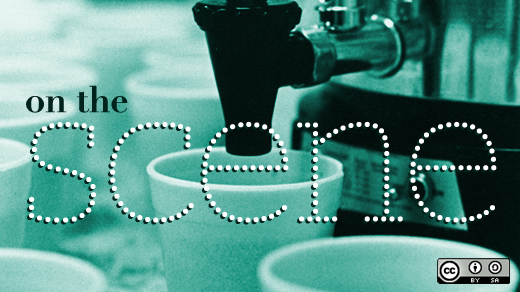At OSCON this year, Jared Smith of Bluehost spoke about how our companies can become good open source citizens. At ByWater Solutions, my job involves engaging in community outreach and getting everyone more involved, so this was a great session for me to attend.
Quite simply, Smith said, any answer to the question of community building must involve building a culture of sustained contribution withinour companies. Smith also spoke about Graham Wallace, author of the 1926 book The Art of Thought, whose model of the creative process formed the outline of the talk. In this book, Wallace says the best way to learn a new skill is to begin with preparation; the next step is incubation; and finally, we see the light during the illumination period, which leads us to the implementation of a skill.
Preparation
Smith said the first thing we need to do is make connections. To do this, we should communicate with the community around the project with which we want to work: join a mailing list, post on a forum, log in to the IRC channel, etc. Next, we need to understand the legal issues associated with joining an open source community. This means both the licensing issues and any internal legal issues we might need to address before participating and sharing our work.
Incubation
Once we're ready, we can make small contributions to our projects. These can be bug fixes, documentation amendments, translations, marketing contributions, and more. Smith recommended going a short distance the first day—so we can always go back and start over if necessary.
Illumination
This is where we get to convince our boss (and hopefully not the legal team) why it's beneficial for them to let us contribute to open source projects. Smith said that we should always think about infrastructure because participating in an open source community is a two-way street. While we're contributing, we're usually getting more than we give. This can be an important point we make to management.
Labor costs are also something we need to think about when considering whether to participate in open source projects. We achieve cross pollination—a mix of skills our employees are gathering—by seeing how other projects are working. We also learn how to better evaluate our skills and the skills of others because we're working in broader teams.
When it comes to risk assessment, Smith said, we all already know open source reduces risks instead of increasing them, but we'll need to back this up with numbers and facts when pitching our decision to management.
And when it comes to money, Smith said we should also consider reading this report from O'Reilly: Economic Impact of Open Source on Small Business: A Case Study.
Implementation
Smith shared an ancient Chinese proverb: "Talk doesn't cook rice"—or, as we say in the US, "It's easy to talk the talk, but you have to walk the walk." In other words, we must show people in our company how we've contributed to open source projects and how this participation has benefited the company. We need to devise some metrics for doing this. How are we going to measure ourselves? By the number of patches we submit, the number of bugs we fix—or something else?
Companies thinking of open sourcing something shouldn't just "throw it over the wall" and refuse to accept feedback and code contributions, Smith said. They need to provide a way for people to contribute. No matter how smart one's staff might be, there is always someone smarter out there. We must make sure we have someone in our organization who is in charge of monitoring open source projects, Smith said. This person needs to ensure things are being done—and being done right.
Smith ended with an analogy from the world of photography. Amateur photographers worry about gear, he said, and professional photographers tend to worry about making money. But master photographers worry about lighting. Smith expressed his hope that his presentation shed a bit more light on the process of making open source contributions, and that it helps us avoid getting up with the finances.
One final thing to share from this talk: Smith played a little game of "open source golf" with us. The higher your score in the following quiz, the more improvement required for your community building skills.
- 2 points if you haven't joined an open source community
- 5 points if you have a project but haven't chosen a license
- 2 points if you are just in open source to make more money
- 6 points if you are throwing code over the wall with no feedback loop
- 10 points if you're ignoring bug reports/pull requests for months at a time
- 3 points if you're unable to see the forest through the trees
I'm happy to say ByWater Solutions's score is 0!
How would you or your project/company score?
Series
This article is part of the OSCON Series for OSCON 2015. OSCON is everything open source—the full stack, with all of the languages, tools, frameworks, and best practices that you use in your work every day. OSCON 2015 will be held July 20-24 in Portland, Oregon.






Comments are closed.